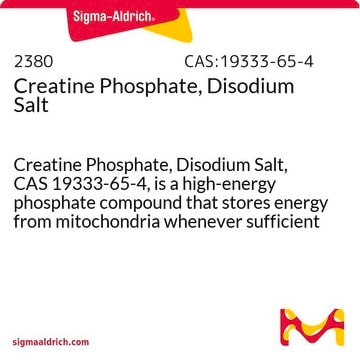P7936
Phosphocreatine disodium salt hydrate
≥97%
Synonym(s):
Creatine phosphate disodium salt, N-(Imino[phosphonoamino]methyl)-N-methylglycine
About This Item
Recommended Products
product name
Phosphocreatine disodium salt hydrate, ≥97%
Assay
≥97%
form
powder
impurities
≤0.02% free creatine
color
white
solubility
water: 50 mg/mL, clear, colorless
storage temp.
−20°C
SMILES string
O.[Na+].[Na+].CN(CC(O)=O)C(=N)NP([O-])([O-])=O
InChI
1S/C4H10N3O5P.2Na.H2O/c1-7(2-3(8)9)4(5)6-13(10,11)12;;;/h2H2,1H3,(H,8,9)(H4,5,6,10,11,12);;;1H2/q;2*+1;/p-2
InChI key
KZVYPOKBYRXZKS-UHFFFAOYSA-L
Looking for similar products? Visit Product Comparison Guide
Application
- as a component: of Xenopus buffer (XB) buffer to remove the membrane-bound proteins
- of M5+ buffer to perform polarized total internal reflection fluorescence (polTIRF) experiments
- of ATP regenerating system for 7-nitro-2-1,3-benzoxadiazol-4-yl phospholipid(NBD-PL) translocation assay
Biochem/physiol Actions
Preparation Note
Storage Class Code
11 - Combustible Solids
WGK
WGK 3
Flash Point(F)
Not applicable
Flash Point(C)
Not applicable
Personal Protective Equipment
Certificates of Analysis (COA)
Search for Certificates of Analysis (COA) by entering the products Lot/Batch Number. Lot and Batch Numbers can be found on a product’s label following the words ‘Lot’ or ‘Batch’.
Already Own This Product?
Find documentation for the products that you have recently purchased in the Document Library.
Customers Also Viewed
Our team of scientists has experience in all areas of research including Life Science, Material Science, Chemical Synthesis, Chromatography, Analytical and many others.
Contact Technical Service











